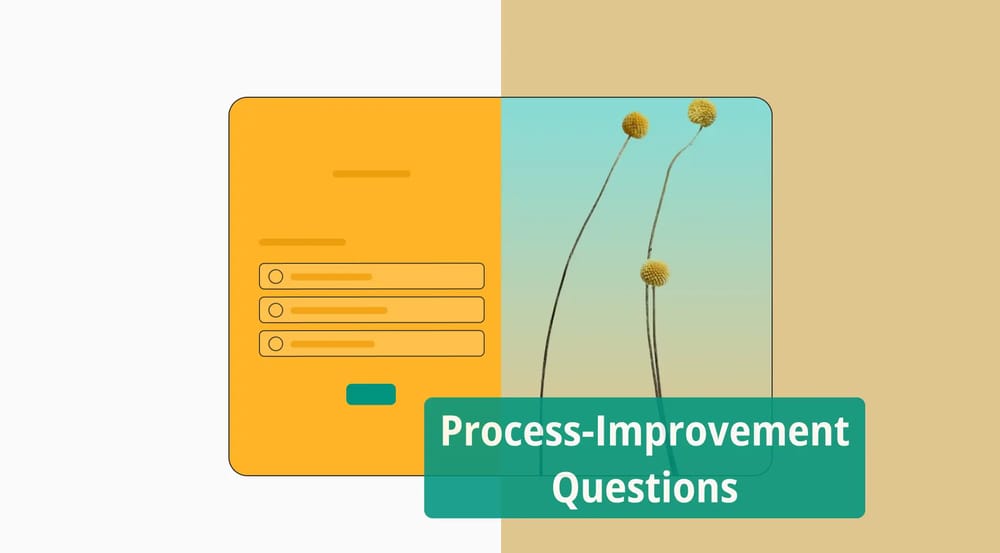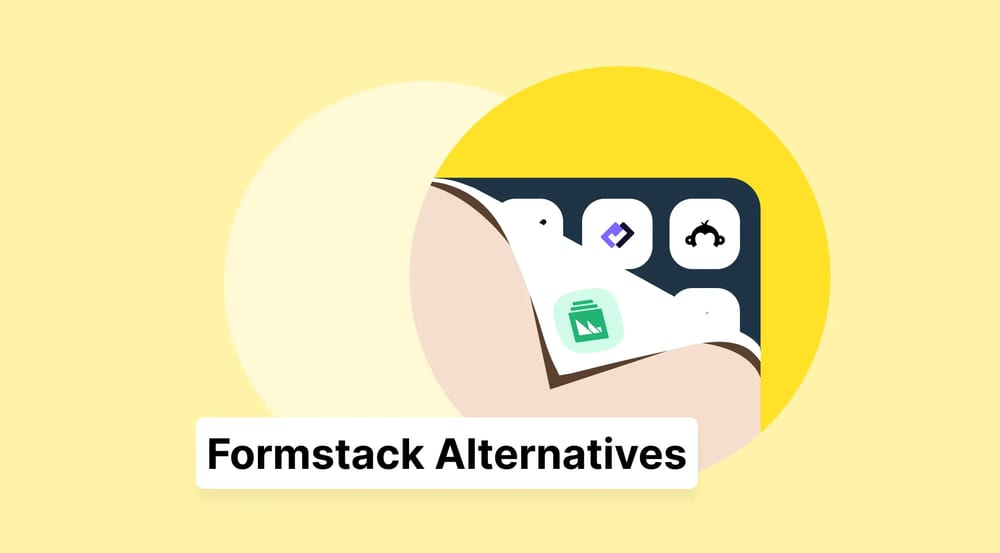Continuous improvement can be achieved through the cooperation of employees and employers. Structured process interview questions conducted periodically for data analysis will allow management to make data-driven decisions about the company's future. They are also good interview questions to learn more about candidates.
Here, we have gathered process-oriented question examples for you to use in the following interviews to make further improvements and learn about your possible future employees. Ask them to answer a series of scenarios and assess their problem-solving skills. Let us get started with the definition!
What is a process-improvement interview?
A process-improvement interview is a type of interview in which employers ask long-term employees or candidates questions to assess their ability to identify problems, streamline operations, and improve existing processes.
Implemented process improvements may need changes or need to involve employees more in the decision-making process. Process improvement efforts should be made to make successful implementations, such as asking appropriate questions.
Why to ask process-improvement questions
Process-improvement questions not only measure the company's success in handling problems but also assess employees' problem-solving skills. They are good interview questions to ask candidates about how they used to deal with problems in their previous roles. Asking process-improvement questions is also good for:
👉 Understanding practical experience: The answers to the questions will help you measure the practical experience of employees in real-world scenarios in your field.
👉 Assessing strategic thinking: You can understand if and how the candidate harmonizes process improvement with broader organizational goals and needs.
👉 Gauging creativity: See if the candidates and the employees can create new ideas and think outside the box in times of need.
👉 Evaluating change management abilities: Find out how well the candidate adjusts to resistance toward driving continuous improvement and implementing changes.
20+ Process-improvement interview questions to ask employees
We have gathered 20+ process improvement interview questions and answer options below that can be used directly on surveys and questionnaires. In addition to job application questions for interviewers to get to know the candidate, have some of these questions as well.
1. Which of the following best describes your approach to identifying processes that need improvement?
- Regularly review all processes and look for inefficiencies.
- Focus only on processes that are causing immediate problems.
- Wait for team members to report issues before taking action.
- Improve processes only when management instructs to do so.
2. When implementing a process change, what is your first step?
- Analyze the current process and identify gaps
- Communicate the change to all team members
- Obtain approval from upper management
- Start implementing changes without delay
3. How do you typically prioritize process improvement projects?
- By the potential impact on the organization
- By the ease of implementation
- By the urgency of the problem
- By the availability of resources
4. What do you do when the root cause of a process issue is not immediately clear?
- Gather more data and analyze it further
- Make an educated guess and proceed
- Consult with colleagues for their insights
- Move on to another issue and revisit it later
5. Which tool or method do you prefer for process mapping?
- Flowcharts
- Value Stream Mapping
- Cause and Effect Diagrams
- SIPOC Diagrams
6. How would you handle a situation where a vital process improvement was met with resistance?
- Engage stakeholders early and address their concerns
- Push through the change regardless of resistance
- Delay the improvement until everyone agrees
- Abandon the improvement effort
7. When analyzing a process, what do you consider most important?
- Understanding the entire workflow
- Focusing on bottlenecks
- Evaluating resource utilization
- Ensuring compliance with standards
8. What is the best way to gain buy-in for a new process?
- Involve stakeholders in the decision-making process
- Present the benefits of the change clearly
- Implement the change and show results later
- Offer incentives for adoption
9. How do you typically handle communication during process changes?
- Hold regular meetings to update everyone
- Send out detailed emails explaining the changes
- Use a combination of meetings and written communication
- Rely on informal channels to spread the word
10. What strategy do you use when faced with strong resistance to a process change?
- Listen to concerns and adjust the plan if needed
- Push through the change despite resistance
- Escalate the issue to higher management
- Abandon the change to maintain harmony
11. How do you ensure that a new process is effectively implemented?
- Monitor closely and provide support during the transition
- Leave it to the team to adapt at their own pace
- Implement the process and check in periodically
- Set strict deadlines for full adoption
12. What do you believe is the key to successfully implementing a process improvement?
- Clear communication
- Strong leadership
- Proper planning
- Stakeholder involvement
13. How do you measure the success of a process improvement?
- By comparing before-and-after performance metrics
- By evaluating team feedback
- By assessing customer satisfaction
- By observing if problems recur
14. Which key performance indicators (KPIs) do you consider most important when evaluating a process?
- Efficiency and throughput
- Cost reduction
- Quality improvement
- Employee satisfaction
15. After implementing a process improvement, what is your next step?
- Monitor the process regularly
- Move on to the next project
- Document the changes for future reference
- Conduct a review meeting with the team
16. How do you ensure that process improvements are sustained over time?
- Regular audits and checks
- Continuous training and development
- Ongoing monitoring and feedback loops
- Rely on the process owner to maintain the improvements
17. How do you typically handle feedback on a newly implemented process?
- Collect it continuously and make adjustments
- Collect it only after a trial period
- Rely on formal surveys
- Encourage informal feedback during team meetings
18. How do you decide when a process improvement needs further refinement?
- Based on ongoing performance metrics
- When team members report issues
- When management suggests additional changes
- After a set review period.
19. How do you stay up-to-date with new process improvement tools and techniques?
- Attend workshops and seminars
- Read industry publications and books
- Network with peers in the industry
- Participate in online courses and webinars
20. What is your approach to introducing a creative solution to a process issue?
- Test it on a small scale first
- Implement it organization-wide
- Present it to management for approval
- Seek feedback from the team before proceeding
21. Which of the following best describes your approach to innovation in process improvement?
- Continuously seek out new ideas
- Focus on improving existing processes
- Innovate only when necessary
- Follow industry best practices
22. What would you do if a creative process improvement idea was initially rejected?
- Reevaluate and refine the idea before presenting it again
- Drop the idea and move on to something else
- Push for reconsideration
- Implement the idea in a different context
23. How do you encourage your team to contribute ideas for process improvements?
- Hold regular brainstorming sessions
- Implement an idea suggestion box
- Offer incentives for implemented ideas
- Discuss potential improvements during team meetings
How to create a process-improvement interview survey (no coding)
Using an online survey helps save time and cost savings while being easy to navigate. If you use an effective survey maker, such as forms.app, your job will be even easier. forms.app has more than 5000 ready-to-use templates and many compelling features and offers a pleasant survey creation experience. Let us see how to create a process-improvement interview survey:
1. Go to forms.app and log in

Log into your forms.app account
Once you go to forms.app, you have multiple choices when creating a survey. You can choose a template, start from scratch, and add the questions yourself. The third way is to use the AI feature of forms.app, where you prompt it, “Generate a 10-question long process-improvement interview survey,” and wait for it to build the survey in seconds.
2. Customize the survey
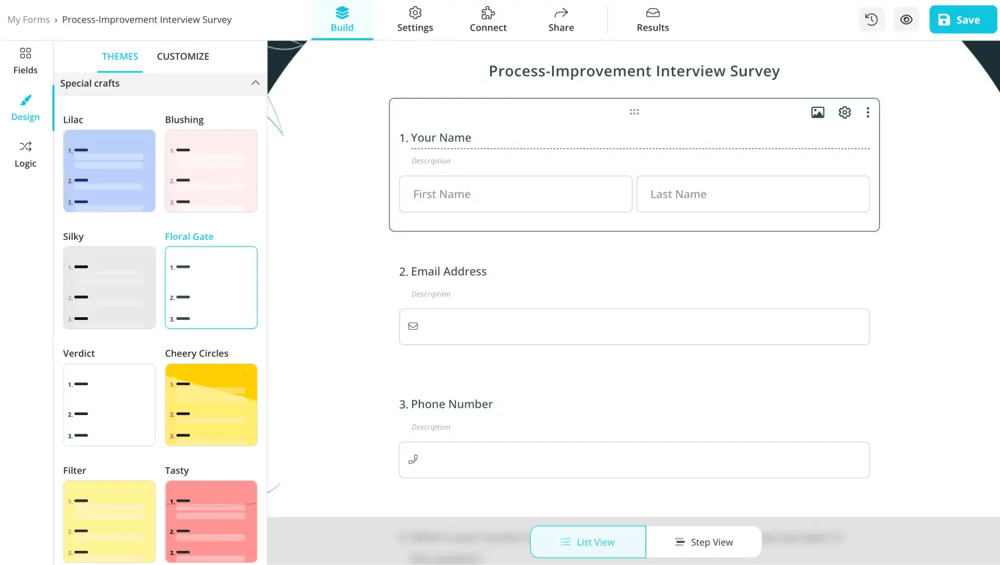
Style your form
You can add or delete the questions if you choose a premade template or use the AI feature. But if you choose to start from the ground up, it is time to add questions from the list we provided above. You can add images, change the background, customize the fonts, etc.
3. Share the survey
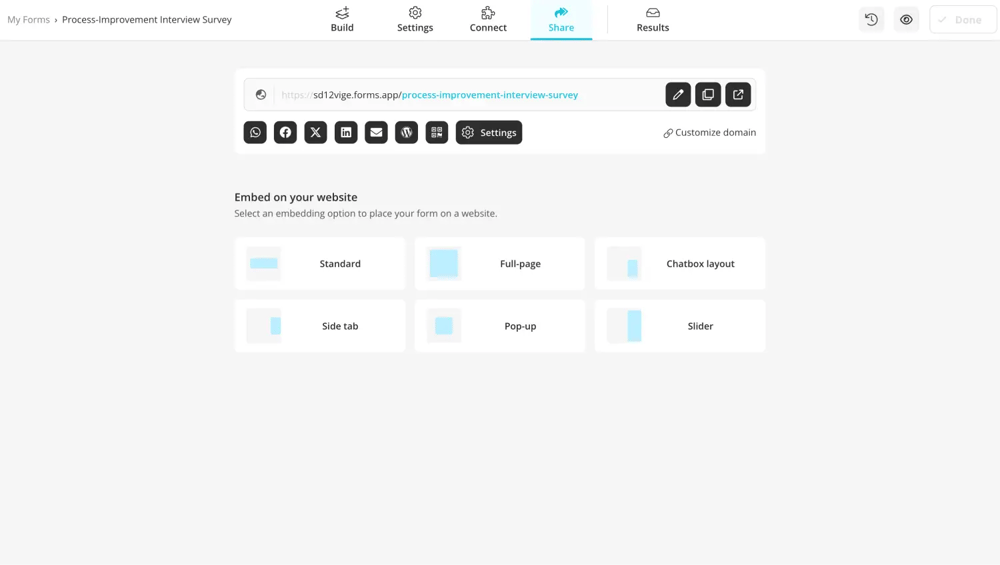
Share your survey
Once you are satisfied with the changes you made, it is time to share them with your employees and candidates to collect their honest opinions. You can set it so that every person can take the survey once to keep it unbiased and truthful.
4. Analyze the results
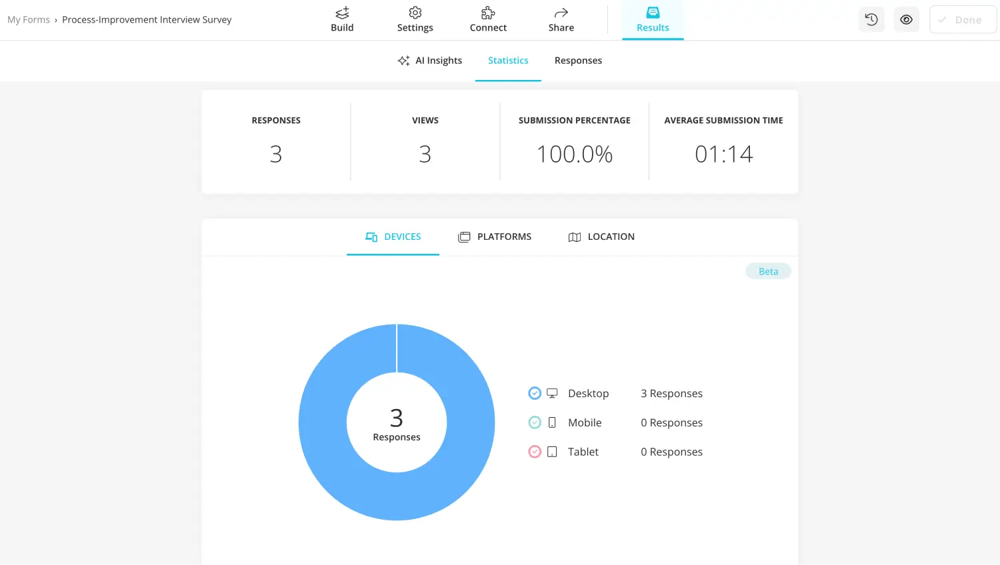
Check the stats
Last but not least, after collecting the submissions, you need to analyze the results carefully. Then, you can take appropriate process improvement initiatives and assess how effective they are after using another survey.
5 Expert tips to take away for your surveys
You can gather a number of questions on a survey, share them, and expect people to answer them honestly. You can also look up tips to ensure the best possible outcome of the survey by knowing what to ask, how to ask, and how to analyze the results. Let us see 5 expert tips to take away when creating your survey:
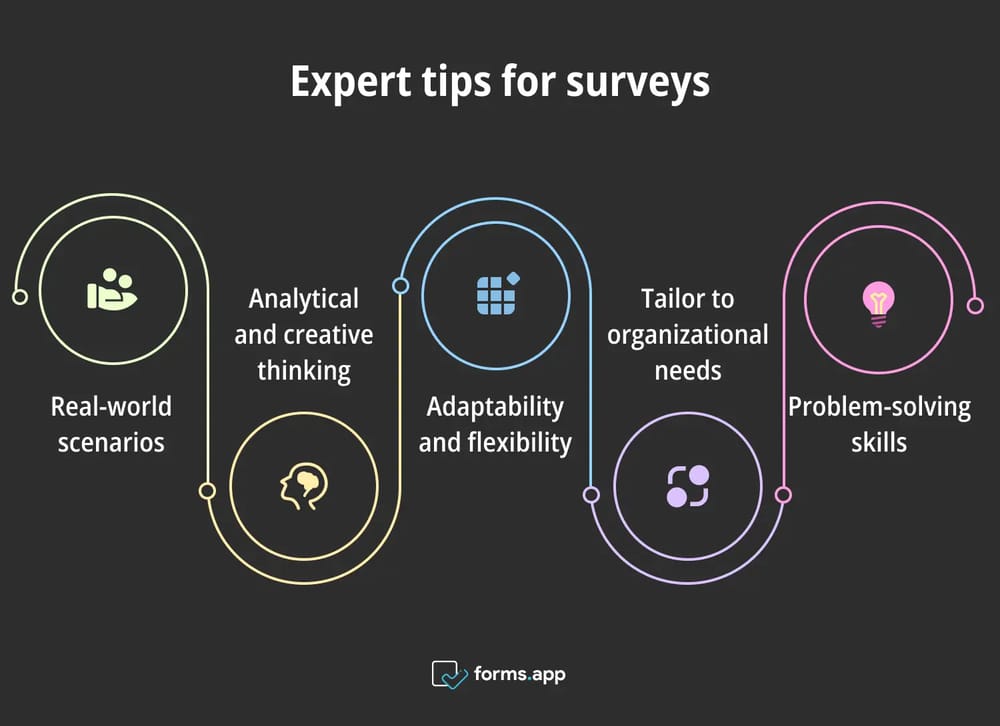
Pro tips for better surveys
1. Focus on real-world scenarios
Have a possible real-world scenario in mind and frame your question around that scenario. Make the question relevant to your organization or industry, and you can see who can apply their skills to practical situations. For instance, “Have you ever had to implement a process improvement within a time constraint?”
2. Measure analytical and creative thinking
Ask people questions where they need to find out the problem by analytical thinking, and a solution to that problem using creative thinking skills. This will help you analyze the candidate’s ability to analyze and resolve the issue.
3. Question adaptability and flexibility
Sometimes processes don't go as planned or things change and new adjustments need to be made without warning. You can ask about this to candidates and employees with a question such as, “Share an experience where you had to make a new plan to adjust to unexpected challenges.”
4. Tailor questions to your organizational needs
Craft your questions in a way for them to be related to your industry and field. You can have better and more relevant results if you focus on asking questions about industry standards, organizational needs, and unique processes.
5. Assess problem-solving skills
Design questions to determine how candidates and employees identify root causes and tackle complex issues. This tip aligns with the star interview method as you ask candidates to describe a specific problem they faced and how they solved it.
Conclusion
Continuous success and effective implementation can be achieved by mutual understanding, communication, and collaboration of employees and employers. Therefore, asking appropriate questions to assess peoples’ process-improvement skills is necessary for the company. That is why we gathered 20+ interview questions and provided tips to keep in mind.
If you are planning to have an interview process with the candidates, you should also check out job interview statistics to avoid surprises on your journey. Good luck with your interview!
forms.app, your free form builder
- Unlimited views
- Unlimited questions
- Unlimited notifications
